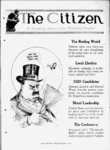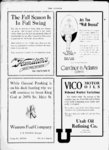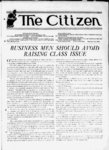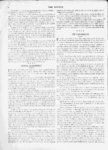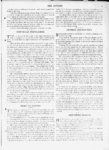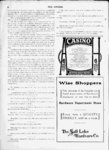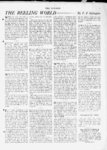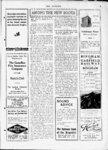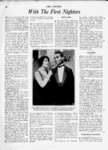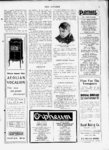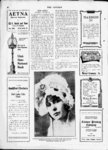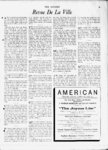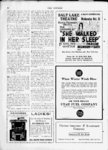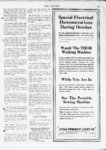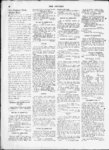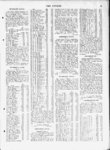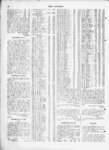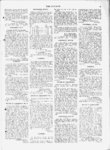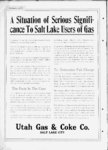| OCR Text |
Show THE CITIZEN THE REELING WORLD . & t HEN we allow our vision to - circle the world and dwell upon the wars, revolutions and strikes we wonder whether they speak truly who say that mankind is weary of war. Sometimes we wonder whether the great war did not instill into men love of violence, not necessarily for its own sake, but as a means of dealing swiftly with real or imagined wrongs. We ask ourselves whether the war spirit, instead of subsiding into a comfortable pacifism, has not retained much of its virulence while changing somewhat its mode of expression. ... race seems CERTAINLY the human different from what it was in those lazy, luxurious days of five years ago when the world, without realizing it, was on the verge of the fiery sacrifice. We knew not then what calamity was. Each was occupied with his own affairs; the woes of other were vague. We hardly ever troubled ourselves with the afflictions beyond the gates of our own country and as for the miseries within the gates of our cities were left them, more or less, to the Associated Charities. And we felt rather snug and contented in our selfishness. We seemed to have a virtue which, in a large measure, we have lost patience. WITH the aid of labor-savin- g we were piling up wealth at reasonable cost and storing it away in the form of skyscrapers, factories, railways, bridges, irrigation projects and public works. We squandered billions, but we made other billions with amazing rapidity. The materialists flattered themselves that man had become a god and that soon the world, by the genius of man, would be rid of poverty, disease and wrong. Then came the war, the paralyzing shock to civilization, the collapse of the materialists self-confidenc- e, the awakening of a world consciousness amid the unparalleled slaughter of the armies coming from the four quarters of the globe and colliding like lost planets. C TT is a simple explanation to say 1 that ' we are simply trying to adjust ourselves after the whirlwind and there is more or less truth in the explanation, but it does not appear to tell the whole truth. Essentially, of course, man is the same as he was a decade ago. His soul has not changed, but his viewpoint and his conduct have. Whether the world is better or worse we cannot tell until we have reached a new state of equilibrium. If we could have foreseen the present condition of affairs in a dream we would have laughed at the dream as utterly absurd and fantastic. Yet the dragon's teeth had been sown in those far away days of a decade and a generation ago. First of all they grew into armed men and clashing armies and now they have grown into strikers, lynchers and red revolutionists. A mad poet leads an army into a city of the Adriatic and bids the world defiance. A mob in Omaha tries to lynch the city's mayor. Race riots of unexampled proportions rend American cities. Strikes in the United States involve hundreds of workingmen and, in England, several millions. Wars continue over much of the earths surface and occasionally, when the censors relax their vigilance, we hear of the revolutions in Ireland, Egypt, India, Korea, Hungary, Germany, Spain and South America. Men may be weary of violence and war, but they still are addicted to the vices that bring violence and war. is not difficult to trace the most conspicuous causes of unrest. The war let loose certain forces which it is not easy to control. It released from the fetters of contentment and conventionalism, radical and revolutionary theories. Every dog and every wolf of theory is having its day. And not only the theories themselves hut the suppressed champions of these theories are swashbuckling up and down the world like so many Captain Kidds, knife in teeth and pistol in each hand. Passions, hatreds, prejudices, insanities, degeneracies, like imps released from the nether regions, are challenging to battle those staid old burghers Law, Order, Patience, and Common Sense. It will he somd time before civil society can win a victory over these demons of unrest. Circumstances almost everywhere on the globe foster discontent. The high .cost of living, misunderstandings between the various classes, race hatreds and the return of armies all make for unrest and a sort of national neurasthenia. The strike in Great Britain is symptomatic. When a people accustomed and the orderly processto es of life succumb to the revolutionary d spirit it is possible to see how is the discontent and it is equally possible to see that the remedy is afar off. IT Self-Contr- ol self-contr-ol By F. P. Gallagher such a sacrifice? Undoubtedly America should and will do what it can to preserve peace and justice at home and abroad, but when it comes to signing a note to guarantee civilization everywhere it will mean war and perhaps bankruptcy. Some kind of a League of Nations is necessary and the world may obtain it, but it has made a bad start. Such a league can be a success only if founded on justice, but the nations are starting with many of the old injustices. Until the nations have done justice from Great Britain to Shantung and from Petro-gra-d to South Africa, a territorial guarantee is a crowning wrong. It will simply maintain injustice and give power to the hand of the despot. Perhaps, out of the present tumult and collision ,will come an equilibrium of justice. Perhaps the nations, seeing nothing but anarchy ahead if they persist in the old wrongs, will set their houses in order. Perhaps, after all, we shall have a League of Nations, founded on justice and peace, and not on injustice and war. Europe is asking us to its civilization the bad with the good many of us are disturbed by evidences of revolution WHILE at home. It would be idle to compare our situation with that of Russia, but it differs only in degree from the British crisis. The revolutionary elements in our society are working through propaganda and riots to pro- duce a state of anarchy which will fall in with their plans for a nationwide revolt that shall give them a chance to establish class control. Our strength lies in our wealth, our solvency and a high standard of living; our weakness in a growing disrespect for authority, for property rights, for human life, for the republiacn institutions which gave us leadership among the nations and for those moral restraints which so far have proved a bulwark between us and our passions. m deep-seate- the which are IN the troubles some of shaking us can de- British Empire tect the reasons why the ruling powers in Great Britain desire the military guarantees of the League of Nations. Confronted by revolutions not only in their dominions, but in Irefar-flun- g land and in England itself, they long for a world alliance which guarantees their territory and existing political independence. Great Britain has more to gain by the compact than any other great power. Should the United States give the required guarantees it will be giving the British Empire an insurance policy backed by our billions of wealth and our millions of soldiers. No wonder that Great Britain is eager for the League of Nations. But how about our country? Is it not amazing that we should be asked to make moral vision has become by the prevalence of dangerous theories and by the augmented power and audacity of the criminal elements of society. No teaching, how- OUR ever dangerous and damnable, that is not exploited. Labor leaders call on their followers to defy government with revolutionary strikes, to defy God with race suicide. It is a strange spectacle in a land virwhere many of the tues still maintain ascendancy. The whole nation has demonstrated its reforming spirit by establishing prohibition. In a sense, however, this shows a lack of for we are relying on law to stamp out a vice which the moral restraint of temperance appeared powerless to overcome. If laws could take the place of common sense and moral restraint we would be a peaceful, happy and contented people, but only the fundamental virtues can preserve a democracy. Laws will not prevent race and class hatreds old-fashion- self-contro- and the violence arising therefrom. Only the moral restraints which made our fathers strong can keep us from disaster. THE I. W. W., the anarchists and criminal elements generally are taking advantage, as never before, of the social turbulence. In Arkansas the authorities discovered that inflammatory literature had been circulated among the negroes. There waa evidence of similar propaganda among the negroes during the war. It has been charged in thehalslof congress that radical propaganda has been at the bottom of many recent disturbances. The trial at Chicago of the I. W. W. leaders proved that the purposes of that organization were purely revolutionary and that its members were striving for the overthrow of our government. But the frankly radical and revolutionary organizations have not been solely to blame. The members of the police force in Boston were good men and true and yet they raised their hands against organized government and aimed as sure a blow at public safety as could have been aimed by revolutionists. When all is going well In the social order we forget how thin is the crust of civilization. The prospect is as pleasing as the vista which charms the eye when one looks upon the grasses and flowers growing in the crater of a long quiescent volcano. Below is the lava of human blindness and passion. Cataclysmic occurrences like the war and like the strikes, riots and revolutions now in progress show us that the thin crust is easily broken and that civilizations very existence can be put in jeopardy. What has become of the liberty under law of which we boasted? The younger men have begun their thinking in a world of chaos. They, like their fathers, love liberty, but, unlike their fathers, they do not understand it. They do not know what it entails. They do not know that it is. founded on common sense, on virtues, on on the principle of live and let live, oh fair play and cool judgment; respect for rights of property, for authority and for human life. -- self-restrai- nt, RETURNED WITH INTEREST. Im very sorry, Mrs. Blunt, drawled the fashionable youth, that I forgot your party last Friday night." "Oh, remarked Mrs. Blunt, innoPittscently, werent you there? burgh Sun. l, SPECTACULAR PROGRAM IN COLISEUM AT STATE FAIR Every Evening at 8 P. M. Trick riding, rope throwing, vaudeville, including Curran, the marvel monpped; Focher, the bicycle king; Salt Lake Opera quartet; "California Frank and his string of riders, and Rodney Hillams operatic burlesque, "Cheating Cupid. (Advertisement.) |
